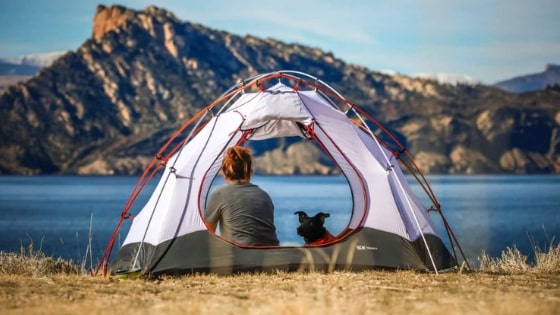Are you looking to implement zero waste camping principles in your next trip? Then you’ve come to the right place.
Applying the zero waste camping mantra is not an easy task. After all, we live in a world where everything has been tailored to our convenience - from plastic cups, plastic bags, plastic utensils to disposable chopsticks. It’s pretty hard to imagine a life without these disposable goodies right?
We all know that we can’t continue living carelessly with this kind of convenience knowing that it has a HUGE toll on our planet.
So we've done the hard work for you and found some things you can do to help you go camping in a way that's kind to our environment too.
Below are some tips on how to take waste-free camping up a notch!

How to Make Your Camping Zero Waste - Guidelines for Beginners
Going on a zero waste camping trip might mean that you will:
- have to exert more effort than usual
- get around more steps than usual
- have more self control than usual
- be more disciplined than usual
- BUT feel a lot better than usual afterwards.
All these small inconveniences add up to something big. If you think one person can’t make a difference, think again!
Here are some guidelines for zero-waste camping you can try in order to successfully implement it.
1. Choose the Right Camping Gears and Tools
They said it all starts with the big buys. And they are right! Choosing the right gear and the right brands greatly contributes to your goal in becoming waste free.
Start with the tent.
Make sure it is durable and can last long for you to be able to reuse it. Also opt for tents that are easy to disassemble after use as most people just leave their tents behind because they are hard to fold again.
If your gear has issues, have it repaired instead of buying a new one. Not only you can save money, but you can also save the planet from unnecessary waste. If you have used gears that you don’t want to use already, don’t throw it away. Instead, give it to someone who needs it. You’ll be surprised to find many people who will appreciate it.
2. Think About How You're Going to Eat
Going zero-waste when it comes to eating is always a challenge, especially if you like to buy pre packed snacks. But alternatives are now beginning to gain popularity, especially as bulk foods are becoming fairly available too.
It just requires a little extra preparation. For example, before you camping trip, buy your foods in bulk and bring your own container or jar to the shop. This means you have just successfully avoided using plastics again.
As well as this, make sure you get your reusable bamboo utensil set which you can eat with instead of disposable plastic cutlery.
Lastly, put all your biodegradable food wastes into a single container so that you can use it as compost in your garden. There’s also a popular thing called the bokashi - a special bran (with good bacteria) which composts your food scraps. It can also stop the foul smells from getting out.
3. Spend Time Selecting The Right Hygiene Products for Camping
Solid soaps and shampoo are the best choice when going waste-free on camping trips and hikes, as they reduce the need for plastic bottles or packaging. Bring alum stones or solid bar deodorants instead of the usual sprays or roll-ons. Tampons and pads can also be replaced with menstrual cups. It might be intimidating to think about it all at first, but just start small and replace as much as you feel comfortable with.
4. Find Alternative to Single-Use Goods
Single-use goods may offer convenience like no other; however, they are the major contributor of waste on a daily basis. Once you realise they aren't necessary and there are much better alternatives, you'll might never go back.
This includes any disposable items from utensils, cups, plastic bags, plastic straws, single-use disposable containers, plastic water bottle, and the list goes on.
Replace your plastic wrap with reusable beeswax wraps, your plastic straws with bamboo straws, your plastic knife and fork with bamboo utensils, and your plastic bottles with reusable bottles.
There’s a whole lot of options out there once we start finding alternatives. And you might even like to expand this into your everyday life as well as your camping trips.
5. Educate Kids About Zero Waste Camping
Educating our kids about the importance of zero waste camping is the best contribution you can make. The future generation will be the future stewards of our planet and starting young at home will surely encourage them to be responsible adults years from now. Teach them that being responsible for their own waste is a significant skill they should learn.
Camping with a Conscience
You don’t have to implement everything that is listed in here all at once. You can definitely set your own pace, as long as you are making progress, that is good enough. Sometimes, people feel pressured and hence they give up midway because they think they suck at it, and that they can’t do it. But that mentality is definitely what we want to avoid. Forgive yourself if you fail on some areas, and start again. It’s as simple as that!
With all the guides and tips for zero waste camping above, hopefully you now feel empowered to take small steps toward achieving your goal. It’s okay if you've had setbacks, just get back on track. Continue pushing the advocacy of zero-waste camping.
Isn't it wonderful to enjoy the beauty of nature, guilt-free?


Leave a comment: